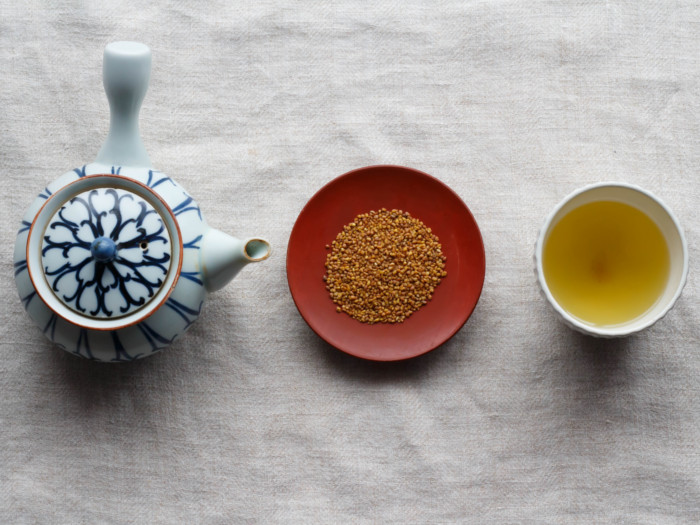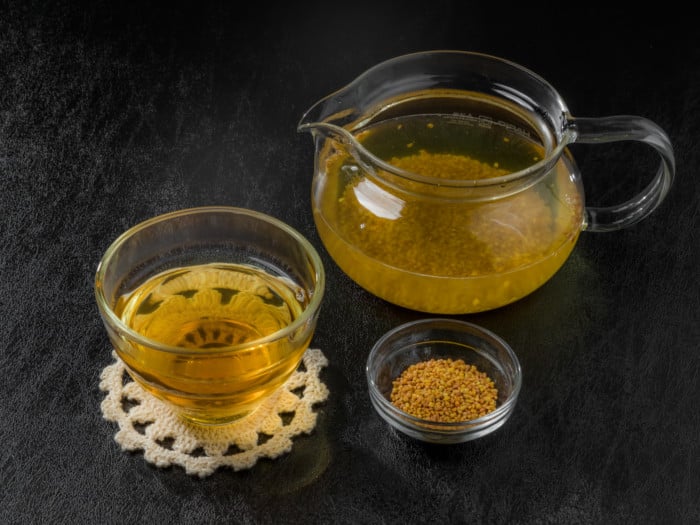Consuming buckwheat tea is an excellent way to boost your overall health and even aid in weight loss efforts.
What is Buckwheat Tea?
Buckwheat tea is a hot beverage prepared by steeping either buckwheat leaves, grains or both, and has been in use for an estimated 8,000 years in some form. Originating in China and Japan, it is still widely consumed in these regions but has also spread to North America and other western countries. Scientifically known as Fagopyrum esculentum, this plant is used for culinary and medicinal uses. When using either the leaves or seeds of the buckwheat plant, it is called buckwheat tea, but there is a closely related beverage, soba tea, that is made from Tartary buckwheat, which is a different species. [1]
Buckwheat Tea Benefits
There are quite a few benefits to drinking buckwheat tea, such as its impact on the following:
- Helps in managing diabetes
- Aids digestion
- Improves heart health
- Promotes weight loss
- Prevents kidney problems

Buckwheat tea is consumed in Japan for its rich nutty roasted flavor. Photo Credit: Shutterstock
Diabetes
Buckwheat works well as a flour substitute in noodles and pancakes, and there is a good reason for people living with diabetes to use it. According to a study published in the Metabolism journal, a diet with buckwheat can modulate gastrointestinal satiety hormones in people living with type 2 diabetes. [2] [3]
Weight Loss
With a low amount of calories and a stimulating effect on the metabolism, as well as the elimination of water weight, this tea is ideal if you are trying to shed unwanted pounds.
Immune System
Buckwheat tea is high in various antioxidants, vitamins, and active ingredients that can protect the body against various infections and pathogens. With vitamin C, the body is able to create white blood cells, the body’s first line of defense. [4]
Digestive System
Studies have found that this powerful antioxidant component can help to improve digestive function, which can eliminate symptoms of bloating and cramping. It can also work to get your bowels moving, eliminating symptoms of constipation. [5]
Cardiovascular Health
Research has shown that regular use of this tea is able to lower levels of blood pressure and overall cholesterol count, which can prevent atherosclerosis, as well as reducing the risk of cardiovascular disorder, particularly in women. [6]
Kidney Problems
If you are suffering from kidney disease, numerous studies have shown that the antioxidants, including rutin, in this tea are able to slow the progression of this condition. [7]
How to Make Buckwheat Tea?
If you want to brew buckwheat tea, all you need is dry buckwheat and a teapot! Follow these simple instructions to make this tea at home.

Buckwheat Tea (Sobacha) Recipe
Ingredients
- 800 ml of water ie. (3 and a half cups)
- 20 grams of roasted buckwheat grain ie. (2 tbsp)
- 1 tsp of honey (if desired)
Instructions
- To make buckwheat tea, boil 3 and a half cups of water in a saucepan on the stove.
- Then add 10-20 grams of roasted buckwheat grains to the saucepan and boil for 30 seconds to 1 min.
- Thereafter, add the roasted buckwheat grains and boiling water in the teapot.
- Allow the tea to steep for 3-4 minutes before straining.
- Once done, serve the tea hot and enjoy its smoky flavor. You can add a tsp of honey to it should you want to enhance the taste.

Notes
Buckwheat Tea Side Effects
Despite the many impressive benefits of buckwheat tea, there are some side effects that should be taken into consideration, such as:
- Complications in pregnancy
- Light sensitivity – There have been rare reports of increased sensitivity to light after drinking this tea
- Allergic reactions
- Gastrointestinal and topical skin inflammation
There is not enough research on the effects of this tea on pregnant and nursing women, so it is generally not recommended. If any of these side effects appear, discontinue use, and always speak to your doctor before adding a new natural remedy to your health regimen.

